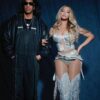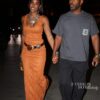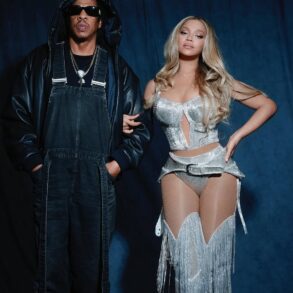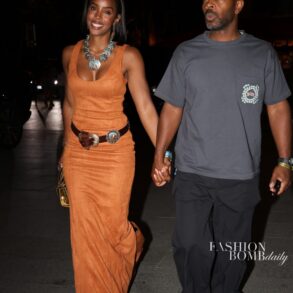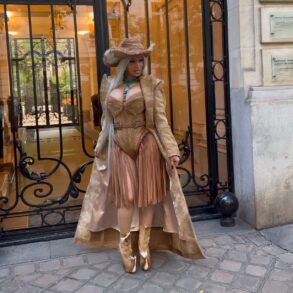Today, Public Enemy‘s 1988 album It Takes a Nation of Millions to Hold Us Back is correctly viewed as a watershed not just for hip-hop, but all of music. But when Questlove‘s father overheard him playing it, it didn’t even sound like music to him.
“He happened to pass my room while ‘Night of the Living Baseheads’ came on and he had a look of disgust and dismay, like he caught me watching porn,” the artist born Ahmir Thompson tells GRAMMY.com. “He literally was like, ‘Dude, when you were three, I was playing you Charlie Parker records, and I was playing you real singers and real arrangers, and this is what you call music? All those years I wasted on private school and jazz classes. This is what you like?’
“I couldn’t explain to him: ‘Dad, you don’t understand. Your entire boring-ass record collection downstairs is now being redefined in this very album. Everything you’ve ever played is in this record,'” he says. “If my dad — who was relatively cool and hip, but just getting older — couldn’t understand it, then I know there’s a world of people out there that are really just like, whatever.”
That nagging reality has powered him ever since — whether he’s co-leading three-time GRAMMY winners the Roots, authoring books and liner notes, or directing Oscar-winning films.
And that path led straight to Questlove’s role as a executive producer for “A GRAMMY Salute To 50 Years Of Hip-Hop,” which will air Sunday, Dec. 10, from 8:30 to 10:30 p.m. ET and 8:00 to 10:00 p.m. PT on the CBS Television Network, and stream live and on demand on Paramount+.
Questlove makes no bones about it: working on that 12-minute Hip-Hop 50 revue at the 2023 GRAMMYs was taxing. So taxing, in fact, that he lost two teeth due to the psychological pressure. But he soldiered on, and the result is an inspiring rush of a two-hour special.
“The thing that really motivated me — Look, man, roll up your sleeves and run through this mud — was like, if there ever was going to be a hip-hop time capsule, a lot of the participants in this show are somewhere between the ages of 20 and 60, and everybody’s still kind of in their prime,” he says.
“So that way,” Questlove continues, “in 2030, 2040, 2050, when our great, great, great, great grandkids are born and they want to look up someone, this’ll probably be one of the top five things they look up. And I wanted to be a part of that.”
Read on for a rangey interview with Questlove about his role in “A GRAMMY Salute To 50 Years of Hip-Hop,” in all its dimensions.
Explore More Of “A GRAMMY Salute to 50 Years of Hip-Hop”
This interview has been edited for clarity.
What can you tell me about your involvement in “A GRAMMY Salute To 50 Years Of Hip-Hop”?
I could be the guy that complains and complains and complains and complains: Man, I wish somebody would dah, dah, dah. Man, somebody needs to dah, dah, dah. And then the universe the whole time is poking you in the stomach like a dog. You think you’re going to be drumming for life — like, that’s your job.
So I went through this period where I just hated the lay of the land. And now people are like, “Well, the door is open if you want to come and see if you could change it.” And for me, it was just important to.
And at first, I was really skeptical about this because even when I was an artist, my peers all the time would — I say in air quotes jokingly, but it’s like, man, I know they’re serious — they would just call me a suit. Whenever someone’s called a suit in a sitcom or it is like, that’s always the bad guy. Or especially for me that’s known for all this artistry.
But for me, it’s like, I can either just sit on the sidelines and watch this thing slowly kind of go in a direction that I don’t want it to go. And often with the history of Black music in America, we’re innovating this stuff, but we’re really not behind the scenes in power positions to control it or to decide what direction it is. And it’s a lot of heartbreaking and hard work.
After the success of the thing that we did in March — that 12-minute revue thing — I’ll be honest with you. For 12 minutes that was like going through damn near, and I’m not even using hyperbolic statements by saying, coming out within an inch of my life.
When that moment was literally over and I was on the airplane landing back in New York, two of my teeth fell out. That’s the level of stress I was [under]. Imagine landing in JFK and I got to rush to “The Tonight Show,” but then it’s like, Oh, wait, what’s happening? Oh God, no! My teeth are falling out! And going to emergency surgery. My whole takeaway was like: Never again.
So of course when they hit me in July, “Hey, remember that 12 minute thing you did? You want to do the two-hour version of it?” I was like, “Hell no.” And of course I hell noed for three weeks and it’s like, “All right, I’ll do it, but I’ll just be a name on it. I ain’t doing nothing.” And then it went from that to like, “All right, what do you need me to do?”
What I will say is it’s a two-hour show in which you got to figure out how to tell [the story of] hip-hop’s 50-year totality — its origins, its peak period, its first moments of breaking new ground, the moment it went global around the world. You got to figure out a way to tell this story in two-hour interstitials and be all-inclusive.
It was just as stressful, even up until four hours ago. I’ll just basically say that my teeth didn’t fall out, thank God. And it was worth everything, because it’s really a beautiful moment.
Sorry for that 12-hour answer, but that’s just how my life rolls.
It was a great answer. What was your specific role behind the scenes?
Oh, I’m a producer. Jesse Collins called a group of us in to help facilitate: me, LL [Cool J], Fatima Robinson, Dionne Harmon, Brittany Brazil. There’s a group of nine of us who were producers.
So, [part of] my actual division of labor thing was finding people to help facilitate music. This is a genre in which maybe the first six years of the art form, there was no such thing as an instrumental. “Or, “Hey, J.Period, can you recreate ‘Check Out My Melody’ by Eric B. & Rakim with no vocals in it?”
Finding the right people to do the music, sometimes I’d have to do it myself. And a lot of people in hip-hop have been super burnt. Super burnt. And I mean, that’s putting it lightly.
And so you’re giving these impassioned, Jerry Maguire, help-me-help-you speeches. The amount of times I was like, “Look, I really want you to reconsider your answer. This is our legacy we’re talking about.”
I’m using terms that a lot of these people, frankly, are hearing for the first time, Because like I’ve said in past interviews, hip-hop started as outlaw music. No one thought it was going to be a thing. So there’s a whole generation that had to lay out the red carpet, just so that the next generation could benefit from it while we disposed of them.
But then that next generation gets disposed of, and then here comes my generation. And then the next thing, you wake up and it’s like, “Oh, we’re not relevant anymore,” and dah, dah, dah.
And I’m trying to convince people, “Wait, you don’t understand. Now we have a seat at the table. Now we get to control. All that we talked about, we need to control our destiny, and this is our culture.” And there was a lot of that. And some people [were like], “All right, I’ll do it for you.” [To which I said,] “No, no, don’t do it for me. Do it for the culture.”
But then there were also people like, “Man, never again. F— all that.” And there was also, “Hey, why wasn’t I asked?” and all that stuff. So in these two hours, you’re going to see eight to nine segments in which we try to wisely cover every base.
This is the “Lyricist” section, and this is the “Down South” section. And [“Ladies First”] is all about the ladies. And this is for those that passed away. And this is for the club bangers. And this is for music outside of America. And this is for the left-of-center alternative hip-hop.
Yes, we wanted to include everybody, but this is network television. And at that, you only get eight to 12 minutes at a time. So that’s even hard. “Hey, why can’t I do my chorus and my verse?” “Look, man, you got 32 seconds.” If you’ve ever seen those “Tom and Jerry” cartoons where they’re juggling plates in a kitchen — like 30 at a time — I don’t recommend that to anybody.
But we got through it. I want everyone to feel proud of where hip-hop has come, because to be nine years old and to get on punishment for hip-hop — you know what I mean? I come from that generation. You’ve got to pay a price to live this culture.
And now it’s established. So that’s why I got involved. So there was a lot I had to do. A lot of calls, a lot of begging, a lot of arrangements, a lot of talking to people about clearing their samples, to call up publishing companies: “Look, it’s just a four-second segment. It’s just one drum roll. Can you please overlook it just for the sake of it?”
The amount of times I had to give those speeches. So yeah, that’s what I had to do.
Jesus.
And that’s just me. It’s nine of us. So there’s lighting directions, and choreography, and wardrobe, and dealing with clearance — like FCC, and, “They can’t say that.” And, “All right, which one of us is going to try to call Snoop to ask him that sort of thing?”
And the amount of Zooms that we were on at five in the morning in the Maldives or halfway around the world.
There must be some component of this process where you recognize that there could never be a perfect two-hour special. There could never be a perfect 200-hour special. There must be something freeing about realizing that nothing can be comprehensive when you’re dealing with a cultural ocean like this.
[At one point], I had to take a hip-hop break. And the first thing that I did a week later, after recuperating, was I went on YouTube and I just watched every award show I remember watching — like prime Soul Train Awards back in ’87, ’88, ’89, the years that Michael Jackson was killing the GRAMMYs.
Award shows were so magical to me, when I was a kid. There was a period just between five to maybe 15 or 16 in which I religiously watched that stuff, and you just take it for granted.
When Herbie Hancock did Rockit back in 1983 with all those mechanical break dancers, I wonder the work and the headaches that it took to make that happen. The drummer from Guns N’ Roses [was] missing while they had to do “Patience” at the American Music Awards — and Don Henley, of all people, was just on the sidelines like, “Does anyone know how to drum?”
I was in the audience during the whole Chris Brown–Rihanna controversy of [2009]. I was literally at the GRAMMYs. There were like 40 minutes left, and I watched the producer run up the aisles.
Because the thing was, that was the year they decided, “You know what? This is going to be the first year in which we’re going to ask artists to double down on stuff. So we’re going to have Rihanna sing three songs, and we’re going to have Chris do two songs. We’re going to have Justin Timberlake. And then, suddenly, their absence now means that there’s five major gaps open.
And they had 40 minutes left before they went to go live and I’m watching the producer make an announcement: “Ladies and gentlemen, something just happened. We can’t get into it.”
The level of viralness now on Instagram or Twitter is expected, but back then it was like, Oh, I wonder what happened? And they’re just running up the aisles to Stevie Wonder, “Yo, can you [mimics rapid-fire, inaudible chatter]?”
And I’m looking at him, pondering: What the hell are they asking him? And then Stevie’s getting up and doing it, and then, “Jonas Brothers, can you duh, duh, duh? Boyz II Men. Where’s Al Green? Is Al Green here?” So literally, I’m watching them solve a headache in real time. And with 20 minutes left, backstage rehearsing, and we were really none the wiser.
I’ve seen that a few times. My very first GRAMMYs was when Luciano Pavarotti got sick and someone just randomly asked, “Hey, does anyone out there know the lyrics to ‘Ave Maria’?” Aretha Franklin raised her hand, and we were all like, ‘Wait, we mean the Italian version, like that ‘Ave Maria.'” And she’s like, “I do know the version.”
We underestimated if Aretha Franklin from Detroit, Michigan knew how to sing something in Italian. And within a half hour she was on that stage and she killed that s—.
So it made me literally recapitulate every award show I ever watched.Now I’m watching with the analytical eye: I wonder what headaches it took to put that together? So, it changed me as a spectator and a participant.
I have a friend who’s been a dedicated hip-hop fan his entire life. We were talking about the 50th anniversary of hip-hop. He questioned the entire enterprise, arguing that it’s an arbitrary number that doesn’t mean much to true rap fans. What does the 50th anniversary of hip-hop mean to you, personally?
Well, to me, it’s important. There’s an interlude that I put on the Things Fall Apart record. The album starts with an argument from [the 1990 film] Mo’ Better Blues in which Denzel Washington and Wesley Snipes’ jazz musician characters are arguing about just the disposability of the art form.
And it ends with a quote from Harry Allen saying that the thing about hip-hop is that most people think that it’s disposable: Let me get what I can out this thing, and I’ll throw them out the window. And on top of that, people don’t even see it as art. And that really hit me in the gut, because I see the beauty of it.
This is kind of why I got into the game of: first it was with liner notes, and then with social media doing these mammoth history posts. And then it’s like, Alright, well, let me write some books, because I’m afraid that no one’s doing this level of critical thinking about this particular thing.
I know that the disdain and the dismissiveness that I got from some of hip-hop’s participants does sort of stem from a place of ego being bruised. And it’s righteous. It’s righteous anger. But I also knew that if I sat on the sidelines, then it’s like when I have grandkids and they Google this, and if it was a half-assed job, then that’s my fault. And I definitely don’t want to be the guy that talks, talks, complains, complains, without being a part of it.
So yeah, for the amount of people that prematurely died before the age of 30, and for the startling volume of people that have recently passed away in the last three years because of health issues, cardiac arrest, strokes, a lot of us are dying… You and I are talking right now, right when Norman Lear has passed away at the age of 101.
I just read that in The New York Times.
Dude, can you imagine “Tupac Shakur Dead at 103″? Can you imagine that for hip-hop?
It’s a survival tool, because for a lot of us, that was the way out of poverty. It was vital for me. I couldn’t just sit back and not watch one person behind the wheel. I have to be the designated driver. So, that’s why it’s important to celebrate that number.
And a big part of my convincing them was like when they were going to pass, like, “Nah, dog, I’m cool. I got a gig that night,” I was like, “Dude, we’re not going to do this for the 51st or the 52nd. And frankly, will we be here?” I will be 92 years old if it makes it to the 75th. You know what I mean?
The only person that got in my face was Latifah like, “Excuse me, I will be here for the 75th and I will be for the 100th. You don’t know when I’m leaving.” So I was like, “More power to you, Dana. All right, good. Queen Latifah will be here for the 100th.”
What I’m gathering from what you’re saying is that no matter what, it’s important to have an organization of this prestige canonize this cultural force.
Oh, absolutely. And I know that oftentimes we play the game of public appearances for the gaze of the establishment. I don’t want to get into that thing either: making performative celebrations just so that the mainstream can celebrate us.
I have to say that when you watch it, it really doesn’t come off as compromised. This thing really looks good. That was the one thing that we laughed at in the group chat, like, “Man, we just went through Apocalypse Now, and are we all saying it was worth it?”
There are at least three people in my production thread that were sort of like, “Uh-huh, never again. I will never again subject myself.” And one of them is dead serious. One of them started doing something the opposite, like, “Nah, I’m just doing classical music from now on. There’s no stress there.” But it was worth it. It was worth it to me.
*Questlove in 2023. Photo: Jamie McCarthy/Getty Images*
It looks to be a classy, expansive special. I’m excited for it to air.
The best part about it? So if you remember, to me, the star of the 12-minute version that we did at the GRAMMYs in March, was Jay-Z.
It was one of the things where it’s like, “Hey, do we even ask Jay-Z?” And that’s the one guy we decided ourselves, “Well, let’s pass on him because number one, he’s already performing with DJ Khaled, so we’ll pass on him.”
Jay-Z actually wound up being the star of that because he was a fan mouthing it in the audience, which to me was almost like better than us just doing a song with Jay-Z on stage. But the audience is the absolute star.
To see Chuck D smile — I’ve never seen Chuck D smile. As all these acts are coming out and Chuck D’s like, singing [Sly and the Family Stone‘s] “Everyday People,” like Boston fans sing “Sweet Caroline” at Red Sox games. Who knew that Chuck D was so jovial about things? But that’s with everyone in the audience watching, supporting each other.
So that to me is also an important thing because as audience members on stage, they’re ripping it, but as audience members, they’re supporting each other. And that, I think is the most important part, because a lot of my take was like, “Wow, I didn’t know that dah, dah, dah was so supportive.” Or, “Man, Nelly actually knows every Public Enemy lyric. Who knew?” There are a lot of “Who knew?” moments that will shock people for this show.
I’m so glad you brought that up. That was one of my favorite moments during the Hip-Hop 50 performance at the 2022 GRAMMYs. Jay-Z is a billionaire twice over and a global cultural figure, but we see him in the audience, grinning ear-to-ear like a little boy, doing finger guns in the air.
He’s getting his life back. And it’s important. Especially now, I’m all about joy. And it’s not even just like this particular hip-hop figure celebrating his music.
When Chance the Rapper comes out, again, I’m like, “Wow, [Cee] Knowledge from Digable Planets knows Chance?” And then I was like, “Well, they got kids, so of course I’m sure their kids play around the house.” I’m doing all this analytical things like, “Wait, how do they know this song? And this is past their age range.”
And that to me is the most telling part of this whole thing, to watch generational people get out of their actual zone and to find out that they’re fans of — when GloRilla comes out, to watch [Digable Planets’ Ladybug] Mecca mouth the lyrics. I was just like, “Oh, wow, OK.”
That kind of puts to bed that stereotype that we only listen to the music in our realm. So, yeah, man — to me, that was the magic part of it all.
This post was originally published on this site be sure to check out more of their content.

